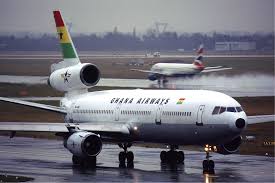 Ghana Airways, the country’s foremost airline, is still in existence, despite attempts by the current and previous governments to ensure its demise as a result of its huge debt overhang and bad management practices.
Ghana Airways, the country’s foremost airline, is still in existence, despite attempts by the current and previous governments to ensure its demise as a result of its huge debt overhang and bad management practices.
The Registrar General’s Department (RGD) through accounting and advisory service firm, PriceWaterhouseCoopers (pwc), has not been able to completely liquidate the company or cancel the name of the once vibrant airline from official books of the country.
The process, which started some nine years ago is now in its final stages, with a couple of litigation cases holding back the exercise.
Pwc, which is the official liquidator, told the GRAPHIC BUSINESS that the debts of Ghana Airways was determined to be US$200 million. The sale of the airline’s assets, however, yielded US$25 million, which has been used to retire the secured creditors of the former national carrier.
The Senior Country Partner of pwc, Mr Felix Addo, told the GRAPHIC BUSINESS that the cases included a suit in the United States, which they won and another in Ghana, which the official liquidator has appealed against. With this, the official liquidators see a closure to the Ghana Airways near in sight.
“This is not unusual in liquidation. The bulk of the work was done in the first couple of years and what is now left is the residual matters. Until these have been settled, we can’t bring a closure to the liquidation of Ghana Airways,” Mr Addo, who has been part of several liquidation exercises in the country, said.
Mr Addo granted the interview in the company of three other insolvency practitioners: Mr Jacob Saah, a legal practitioner, and Eric Nipah, who is also the Director of Advisory Services at pwc, and stated that the government had to step in to retire debts owed to unsecured creditors, who will be paid 10 per cent of their debts, that is about 10Gp for every GH¢1 owed.
Overall, 38 units of Ghana Airways properties were sold. They included residential and commercial property across Ghana, including the head office building at Airport West in Accra as well as properties in the United States, United Kingdom and Sierra Leone.
Absence of law
Ghana Airways is not the only company which has been forced down the path of liquidation. Examples include Bank for Housing and Construction (BHC), Ghana Cooperative Bank, Bonte Mines and Plant Pool.
Although the fortunes of those companies could have been turned around, there is no appropriate legal regime to stay off the hands of creditors to make way for any such restructuring to revive them.
Under the current Bodies Corporate (Official Liquidation) Act 180, creditors of financially distressed companies with no sufficient net assets to cover its liabilities could cause the liquidation of such body corporates if the said company cannot honour its liability within 21 days after a demand notice has been served.
This means that companies with lack of working capital or liquidity cannot use the alternative of a restructuring plan to revive their fortunes, to save the company, the workers and revenues to the government, as pertains in other jurisdictions such as the United States, which has the Chapter 11 that allows companies to restructure and revive their operations rather than being allowed to go under.
“The current Act does not provide framework for negotiating and approving binding reorganisation plans before or after the commencement of insolvency,” Mr Jacob Saah, who has been involved in several liquidation and insolvency processes, explained at the same interview.
GARIA
To plug the loophole and move Ghana’s insolvency regime in tandem with international best practice, insolvency practitioners, made up of accountants, lawyers and bankers, have come together to push for the enactment of a new law to regulate insolvency in the country.
The Ghana Association of Restructuring and Insolvency Advisors (GARIA) has since 2006 been reviewing the current Bodies Corporate Act, which has culminated in a draft new bill which is currently before Cabinet for consideration.
The new regime will provide for the involvement creditors in a liquidation process and can stay execution of proceedings between the order for liquidation and actual commencement to make for the implementation of a turnaround time.
Other companies
The three experts believe that if that regime were in place, companies such as Ghana Airways, BHC and the rest could have been revived to save jobs and revenue for the country and the company in question.
This is because most of the distressed companies were asset rich and only cash-trapped and a proper restructuring plan could help them out of the woods.
Mr Nipah said in the case of Plant Pool, which is now known as JA Plant Pool, funds realised from the sale was enough to retire the entire liabilities of the company, with capital returned to the shareholders, the government.
He said the BHC sale paid up to about 80 per cent of debts, with the government stepping in to settle depositors, a necessary action to forestall the eroding of confidence in the banking and financial services system. This means the company was asset-rich, and with adequate working capital could have bounced back.
The goodwill and loyalty for GA
Mr Saah said the team discovered during their visits to Ghana Airways assets in other countries that the former national carrier had a lot of goodwill, strong brand and loyal customers, but poor management, which made a good case for restructuring.
Indeed, before the liquidation processes, experts from pwc who had helped to revive Air Jamaica were brought for a similar exercise on the airline, but the legal lacuna again made it difficult to protect any new capital injection, given the huge debt portfolio of the company.
“Ring fencing the debt was the biggest challenge; how to ensure that new capital invested does not sink into the payment of debts,” Mr Addo said.
The restructuring practitioners believe that when the new law is passed it would cure that lapse and enable such asset-rich but distressed companies to have a breather from their creditors once a restructuring and turn-around plan was in place.
